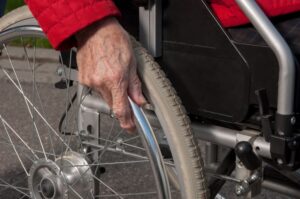Steps to Take if Nursing Home Negligence Causes Death
Abuse and NeglectThe idea of moving a loved one into a nursing home is never easy. However, you make this decision because you know the nursing home can provide better-skilled care than your loved one can get at their own home or from living with you. Sadly, not all nursing homes operate according to the law. Negligence on the part of the staff can lead to the death of your loved one. If you experience such a horrific loss, you must take the proper steps to secure compensation for damages. The first step is speaking with a nursing home neglect attorney.
Causes of Nursing Home Wrongful Death
 More than 300,000 wrongful deaths occur each year in the United States because of preventable injuries in nursing homes or hospitals. If any of the following occurred, the death of a loved one in a nursing home can be wrongful death:
More than 300,000 wrongful deaths occur each year in the United States because of preventable injuries in nursing homes or hospitals. If any of the following occurred, the death of a loved one in a nursing home can be wrongful death:
- The nursing home failed to prevent violence between residents.
- The staff failed to administer prescription medication to your loved one.
- The staff physically or sexually abused your loved one.
- Bed sores were left untreated to the point of infection.
- Sepsis was left untreated.
- Dehydration or malnutrition occurs due to the lack of proper nutrition.
- The nursing home did not prepare for preventable deadly falls.
- Misdiagnose or fail to diagnose the resident’s condition.
How is Negligence Present in a Nursing Home?
Negligence can appear in a nursing home in any of the following ways:
- Abuse: This can include sexual, financial, physical, and emotional abuse.
- Inadequate care: If the staff fails to provide care that meets the standards set forth by the state, and the resident dies of malnutrition or a preventable infection, negligence is present.
- The environment: Negligence may cause death due to poorly maintained buildings, unsafe facilities, and unclean environments.
- Hiring: Negligent hiring is a serious issue plaguing nursing homes. Staff members hired without proper background checks or training can cause residents to suffer injuries and even death, which can be considered negligence.
Am I Eligible to File a Wrongful Death Lawsuit?
If your loved one died in a nursing home due to negligence, you can file a wrongful death lawsuit if you fall into one of the following categories:
- Immediate family: Spouse, child, adopted child, and in some cases, common-law spouses or life partners.
- Extended family: Cousins, siblings, and other relatives
- Someone who has suffered a financial loss: If you suffered a financial loss due to the person’s death and are not a relative, you might be eligible to file a wrongful death lawsuit
If you are unsure whether or not you are eligible to file a wrongful death claim after a loved one died in a nursing home, you need to talk to a nursing home abuse lawyer about your case. A lawyer can evaluate your case and provide an honest answer. Should it be determined that you can be the plaintiff in the case, the lawyer can begin conducting an investigation, collecting evidence, and building a strong case in your name.
What Evidence Do I Need for My Wrongful Death Lawsuit to Be Successful?
If you want your wrongful death lawsuit to be successful, you will need to provide some or all of the following types of evidence:
- Photos of the injuries your loved one suffered before their death
- Medical records that prove care provided by the nursing home was inadequate
- Copies of all communications with the administrative staff of the nursing home
- Any videos you might have of nursing home staff abusing your loved one
- Written testimony from caregivers
- A timeline of the nursing home abuse leading up to your loved one’s death
- Witness statements from family members, other residents, other visitors or staff members
A nursing home abuse attorney can gather the necessary evidence to support your claim.
Steps Your Family Should Take After the Death of a Loved One in a Nursing Home
The loss of a loved one due to negligence in a nursing home brings grief, anger, and sadness. You need to protect your rights, and the rights of your now-deceased loved one when negligence was present in their death. Your family can take the following steps, in no particular order, if nursing home negligence causes death.
- Request a Medical Examination
- Notify the Authorities
- Document Everything Related to Your Loved One’s Death
- Do Not Discuss the Case Publicly
- Collect All Financial Records
- Lean on Your Support System
- Attend Counseling
- Secure a Nursing Home Abuse Attorney
- Communicate Regularly With Your Attorney
- Care for Yourself and Your Family
Request a Medical Examination
Even if the cause of death is apparent, an autopsy is still a smart thing to request so that you can have everything documented. The documentation will be instrumental in any legal claim you file against the nursing home.
Notify the Authorities
If you are under the assumption that your loved one’s death was due to negligence or a crime, be sure to notify the proper authorities. Law enforcement and other regulatory agencies can conduct investigations that might help your case.
Document Everything Related to Your Loved One’s Death
 Collect originals or copies of every document related to the death of your loved one and store them in a safe place. Be sure to acquire all of the following, if possible:
Collect originals or copies of every document related to the death of your loved one and store them in a safe place. Be sure to acquire all of the following, if possible:
- Video or photographic evidence
- Medical records from before your loved one’s death
- Communications with witnesses, healthcare providers, and others
Do Not Discuss the Case Publicly
Avoid discussing the case publicly, even if you have yet to file a claim. Any comments made publicly, especially those on social media, can wind up returning to hurt your legal case against the nursing home.
Collect All Financial Records
The financial records of your loved one will be pertinent to your wrongful death claim. You should also include all finances expended from your pocket leading up to and after your loved one’s death related to their care, funeral, and burial.
Lean on Your Support System
Do not underestimate the value of your support system in your family members and friends. Lean on them as much as possible to navigate through this challenging time. They can offer emotional support and valuable advice and insights if they have experienced similar situations. Sharing experiences and seeking guidance from those caring about you can provide comfort and strength as you cope with your loss.
Attend Counseling
Grief counseling can provide invaluable support during this challenging time, helping you navigate the complex emotions and uncertainties that come with losing a loved one. A qualified counselor can offer a safe space to express your feelings, process your grief, and learn coping strategies to manage the pain. Additionally, connecting with others who have experienced similar losses through support groups can offer a sense of understanding and solidarity. Remember, seeking help is not a sign of weakness but a courageous step towards healing and finding peace amidst the pain.
Secure a Nursing Home Abuse Attorney
During the initial consultation, don’t hesitate to inquire about the attorney’s experience with similar cases and their success rate. Be transparent about your concerns, and provide relevant documents or evidence regarding your loved one’s situation. Remember, the attorney is there to advocate for you and your family’s rights, guiding you through the legal process with compassion and experience.
Communicate Regularly With Your Attorney
Once you’ve selected an attorney, maintain regular communication with them. Ensure to forward any correspondence you receive from insurance companies, the nursing home, or other parties involved in the case. Promptly respond to their calls and emails, and make an effort to attend all scheduled meetings. Consistent communication with your attorney will keep you informed about the case’s progress and strengthen your understanding of its intricacies.
Care for Yourself and Your Family
Self-care during this challenging time is crucial for maintaining your emotional and mental well-being. This applies not only to yourself but also to your family members. Make it a priority to continue having dinner together, cherishing each other’s company, and supporting one another’s healing journey as a unit. Be mindful to steer clear of developing unhealthy coping mechanisms, as these can be difficult to overcome in the long run.
The Role of a Law Firm in a Nursing Home Wrongful Death Case
When you work with an experienced law firm on a nursing home wrongful death case, you can come to expect the following from the legal team:
- Compassion: The firm will provide compassionate and understanding support throughout the process so you can focus on healing.
- An aggressive advocate: A nursing home abuse attorney will advocate for your case. We fight vehemently to ensure that negligent nursing homes are held accountable for their actions.
- Conduct a complete investigation: The legal team you choose will conduct a complete investigation into the death of your loved one. This includes speaking to witnesses, nursing home employees, medical specialists, and other professionals.
- Guidance along the way: You will never be left in the dark when you file a wrongful death lawsuit against a nursing home with the help of a nursing home abuse attorney.
Proving a Wrongful Death Took Place in a Nursing Home
When filing a wrongful death lawsuit in civil court, the plaintiff is responsible for proving to the jury that there is a greater weight to the evidence presented. This differs greatly from a case in criminal court, where you must show beyond a reasonable doubt that a crime occurred.
Because of the difference, you only have to show that the scales tipped towards you slightly. This difference often signifies a comparison of 51 percent versus 49 percent. So, you need to show that the actions of the nursing home staff probably led to the death of your loved one, not that they did.
Some items that you will need to show in the case include the following:
- The nursing home had a contract it was supposed to follow when caring for your loved one.
- There was a breach of duty in the care provided to the resident by the nursing home.
- The nursing home committed the actions described by the plaintiff in the lawsuit.
- The actions led to the decedent’s harm while in the care of the nursing home.
What Are the Stages of a Nursing Home Wrongful Death Lawsuit?
For the most part, you will experience the following stages when filing a nursing home wrongful death lawsuit:
- The hiring of a lawyer to represent you in the case
- Pleadings: This includes filing the initial lawsuit with the court and the defendant responding to the lawsuit
- Discovery: This includes obtaining information from the other party named in the lawsuit to bolster your case
- Settlement: This includes agreeing to terms out of court with the defendant
- Trial: Appearing in court before a judge is necessary if parties do not settle.
What Compensation Can I Recover in a Nursing Home Wrongful Death Case?
 Surviving family members of a nursing home wrongful death victim can recover compensation for their loss and the financial impact of the loss. The type and amount of compensation will vary based on your case’s specific circumstances, but you can recover for the following:
Surviving family members of a nursing home wrongful death victim can recover compensation for their loss and the financial impact of the loss. The type and amount of compensation will vary based on your case’s specific circumstances, but you can recover for the following:
- Loss of consortium (often paid for the loss of a spouse or other close relationship)
- Funeral and burial expenses
- Pain and suffering
- Medical expenses caused by the negligence of the nursing home
- Punitive damages (a judge awards punitive damages when the facility staff’s malicious actions or intent to punish the facility are evident)
How to Find the Right Nursing Home Abuse Attorney
When the time comes to find a nursing home abuse attorney, be sure to look for the following qualities and experience:
- The lawyer has strong client testimonials and referrals
- The lawyer is willing to meet you during a free consultation
- The lawyer answers all of your questions honestly and thoroughly
- The lawyer can explain how they communicate with their clients and how often
- The lawyer has experience taking on nursing home abuse cases that have resulted in death
- The lawyer does not shy away from taking the case to trial to ensure you receive fair compensation for your loss
Talk to a Nursing Home Abuse Lawyer Today
If you lost a loved one due to negligence in their nursing home, you need to speak with a nursing home abuse attorney as soon as possible about your case. You can have a compensation case to help pay for your loved one’s funeral and burial expenses, pain and suffering, loss of consortium, and other damages. Get in touch with a reliable and empathetic personal injury lawyer today to explore your options.
Nathan Hughey, an attorney and fourth-generation South Carolinian, founded Hughey Law Firm in 2007. Before that, he spent five years defending nursing homes and insurance companies. Leveraging his experience, he now advocates for those injured or wronged by such entities, securing over $220 million in verdicts and settlements.
